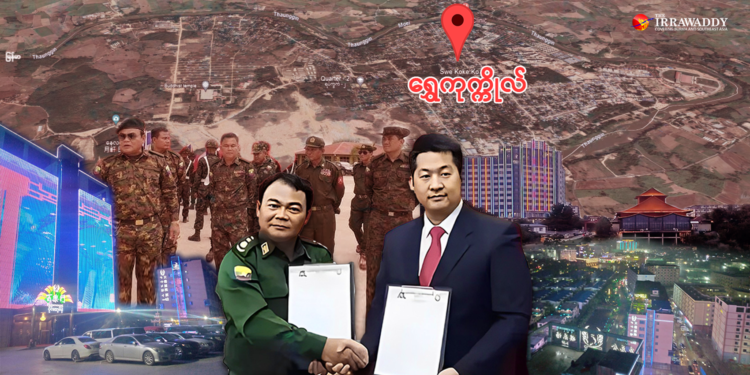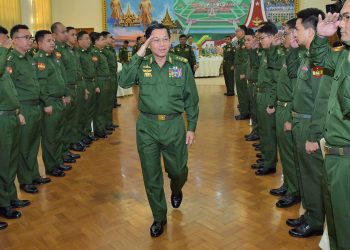The sex workers are from China, Vietnam and Thailand, but the drugs are Made-In-Myanmar. Both are sold openly in so-called “Hi” rooms in Shwe Kokko’s towers, where workers from every corner of the region spend their days and nights tracking down strangers online, often elderly Americans, to scam them out of their life savings.
In an interview with The Irrawaddy, a member of the civil disobedience movement (CDM) duped into working for a cyber crime center explains how the centers operate.
Located a stone’s throw from Thailand in Karen State’s Myawaddy township, Shwe Kokko is reportedly run by the leader of Karen State Border Guard Force (BGF), Colonel Saw Chit Thu. When fighting between regime troops and ethnic Karen resistance fighters escalated in Myawaddy last month, the colonel played both sides to protect the criminal enterprises he thrives on.
Shwe Kokko is a joint venture between Chit Lin Myaing Co run by Saw Chit Thu’s BGF and the Myanmar unit of Hong Kong-registered Yatai International Holding Group. The online scam centers in Shwe Kokko target victims around the world, but are increasingly turning to the lucrative American market, according to a recent report by the United States Institute of Peace.
The BGF earns US $192 million annually from Shwe Kokko and the Myanmar army gets about 50 percent of it, according to the US Congress-funded institute.
The CDM member described the scam center he worked for as “the biggest online scam center inside Shwe Kokko.” After a brief stint in its maintenance department, he moved up from being a janitor to scamming people himself.
Shwe Kokko is rife with transnational crime, including prostitution, narcotics and human trafficking, all fueled by cyber scams, he says. The interview has been edited for length and clarity.
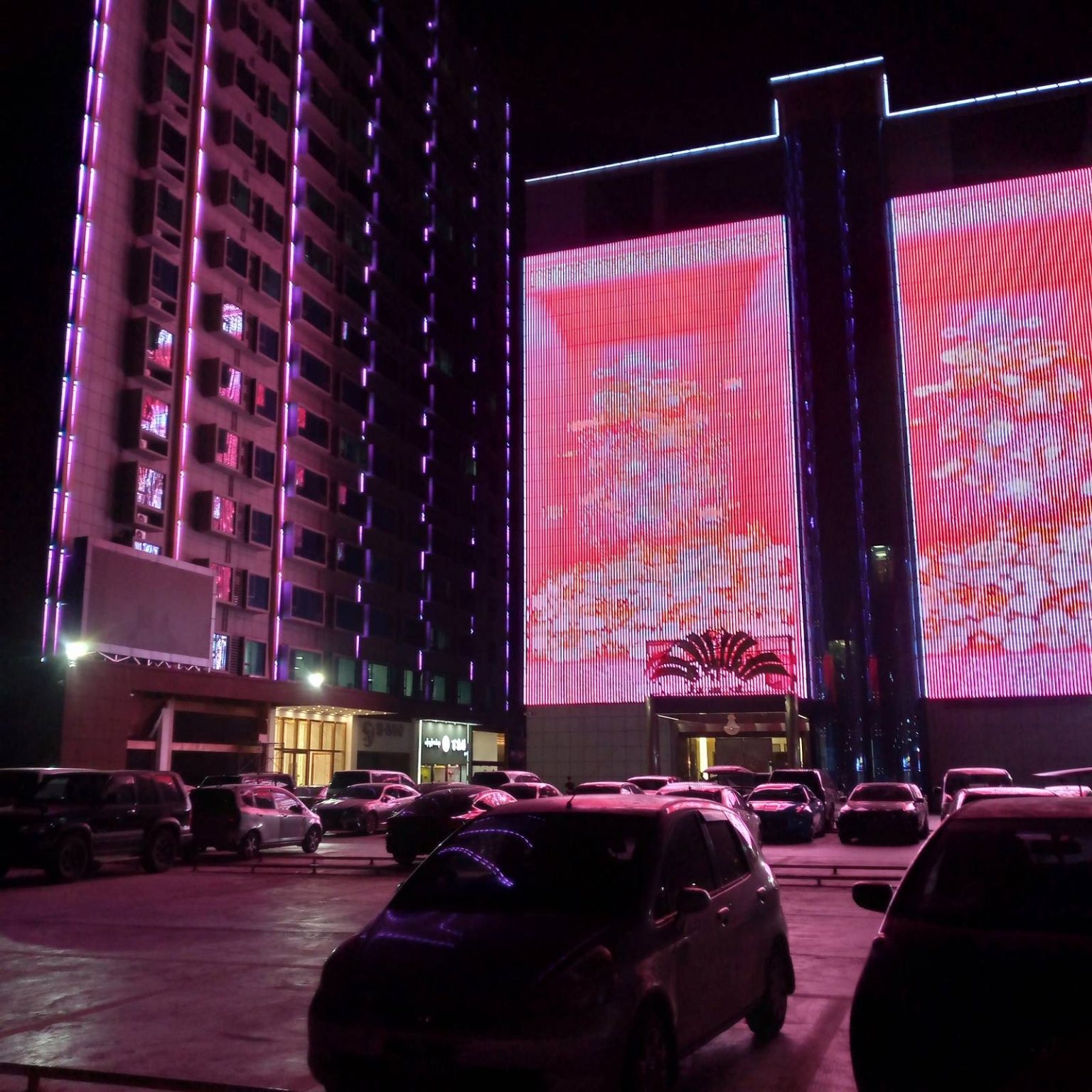
How did you end up working at an online scam center in Shwe Kokko?
A friend working in Shwe Kokko contacted me, but did not say it was a scam operation. He only said there was a high-paying job and that the employer was Chinese. I was jobless and had been in hiding [after joining the civil disobedience movement, CDM]. So, I went there and worked for a year. I was not allowed to leave the scam center in the early days. The basic salary for Myanmar nationals was 12,000 baht, plus an additional 2,500 baht for working the whole month without taking time off. I got about 18,000 baht a month. Meals and accommodation were also provided.
Please tell us about your job there.
You can’t enter Shwe Kokko unless you have a pass. The security inside Shwe Kokko is controlled by Yatai Co. You can’t apply for a job directly to online scam centers. The former chairman of Yatai was arrested in Mae Sot. The would-be chairman is a Chinese man in his 40s. His wife is also a Chinese woman in her 40s. After you enter Shwe Kokko, you have to do a job interview with Yatai first. Only after you are approved by Yatai can you proceed to apply at online scam centers that are recruiting. No company can recruit without approval from Yatai.
What were the working hours? What was your job?
I had to work from 6 pm to 4 am. I had to find at least two targets a day. If I couldn’t, I had to work overtime until 6 am. They mainly targeted European and US citizens, particularly elderly persons who are easy to swindle. I heard the phone numbers [used to contact people] were bought from [fraudsters in] Thailand. Each of us was given about 50 phone numbers.
We were basic workers. Our job was to send text messages to the phone numbers and pretend as though we had mistaken the person who received the message for someone else. Then, we chatted with them for a week or so to develop trust. Our job was done when we were able to build [a rapport] with them. The rest was taken care of by professional Chinese swindlers and [staff] who spoke fluent English.
They sent fake business data to potential victims and persuaded them to invest in fake companies by promising huge profits. When they tried and invested some money, a bit of money was transferred back as a profit in the beginning. When they invested large sums, their money was seized and their accounts were blocked.
We had to find at least two to three targets a month who could be successfully swindled, otherwise we were punished. Punishments included a salary deduction, a deduction of one meal for several days, and forced overtime.
The second method [of scamming] was to use hackers to access the bank accounts of the targeted individuals. So, when they find out the account, hackers sent them links and tell them to click on the links. Then, they hack the accounts of the targets and transfer their money into the accounts of online scam centers.
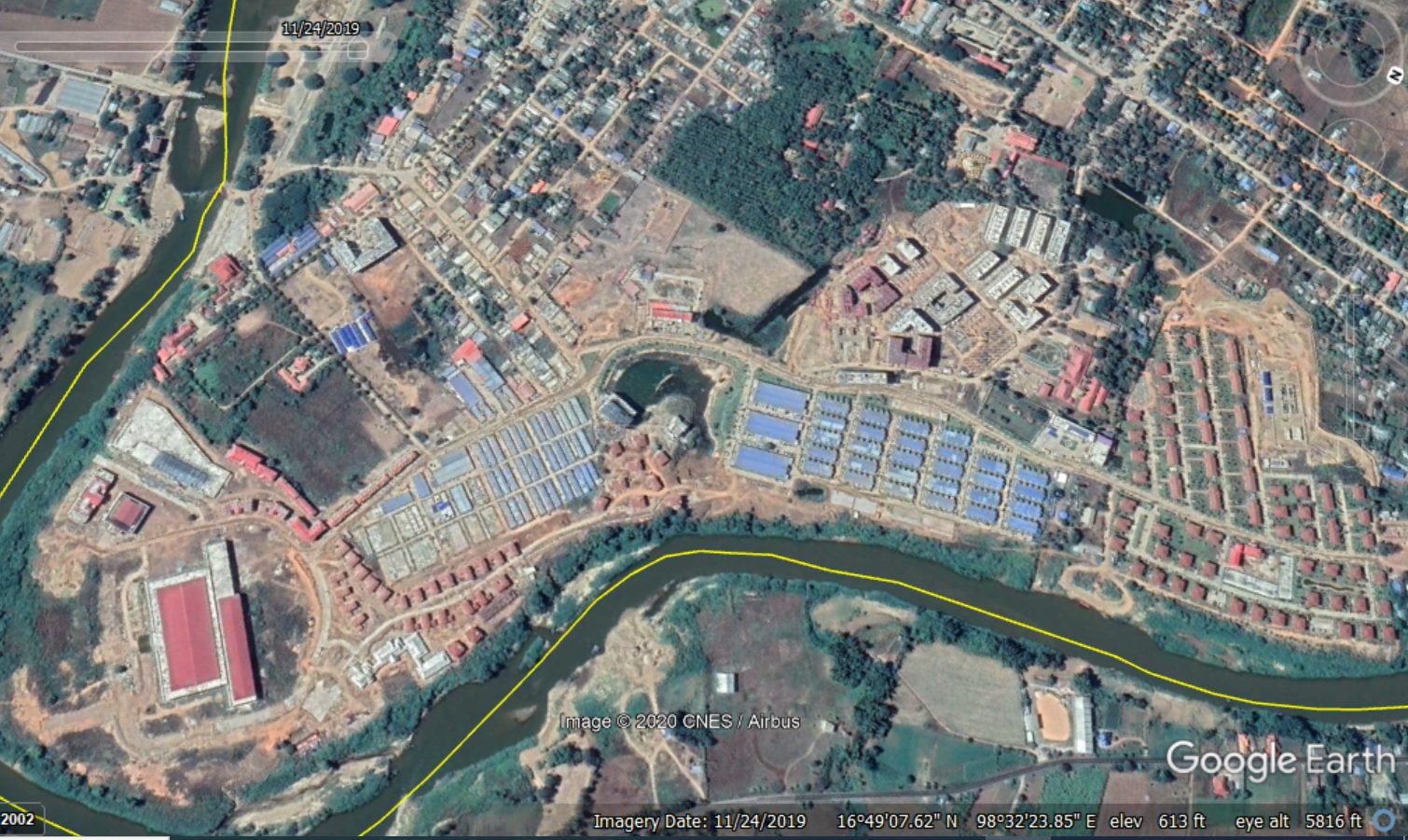
What do they do to get banking information?
They send fake emails or text messages. For example, a message about winning a prize or a potential investment with a link to fake login pages.
Two Vietnamese hackers were tortured for an entire night after they failed to hack a bank account. Security guards and scam operation leaders tased and beat them the whole night. When I went to work in the morning, one of them had passed out. He was being put into a vehicle. A Myanmar national security guard showed me the video of [two Vietnamese men being beaten]. The Vietnamese hackers came via Thailand across the Moei River. No foreigner came to Myanmar directly.
What were the nationalities of people working in the scam centers?
There were Chinese citizens and Chinese Shan from Shan State. There were hackers from Thailand and Vietnam. There were only one or two African citizens at our scam center. Foreigners were lured by false promises of technical jobs in Thailand. When they came, they were brought across the Moei River into Myanmar.
Foreigners did not realize that they had been taken into Myanmar. After they were taken into one of the scam center compounds, they were not allowed to leave. There were security guards. Normally, Myanmar nationals do not hold important positions in online scam operations there, so their movements are not heavily restricted. Foreigners are heavily restricted [and] Myanmar citizens in important positions are not allowed to leave the compound either.
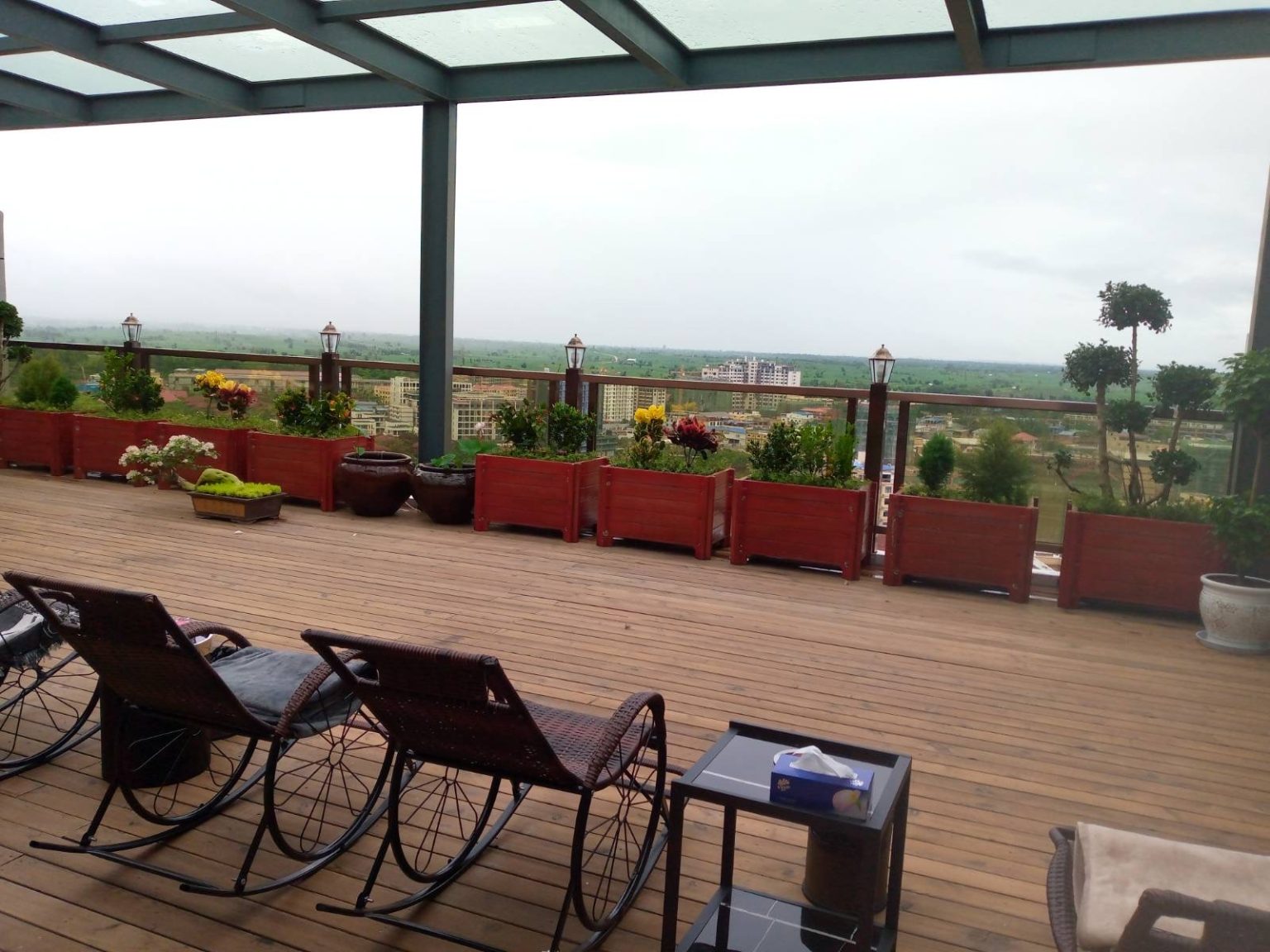
Do you know how many online scam centers there are in Shwe Kokko?
There are about 30 scam companies that employ at least 100 people each. There are also smaller ones that employ around 20 people. The company I worked at was the biggest of them. It is in a 17-story building with online scam operations, casinos and prostitution. It has about 200 employees working in online scams. If combined with employees working in casinos, there might be around 500 workers.
The boss lives on the top floor. The 15th and 16th floors are occupied by senior members of the company. Prostitution and restaurants occupy the lower floors. Online scam operations are on the 5th and 6th floors. Residential wards and compounds are separated.
What does the BGF do at Shwe Kokko?
They provide security outside Shwe Kokko. Inside Shwe Kokko Myaing compound, there were five checkpoints. Two more have been built, so there are seven checkpoints now. The checkpoint at the entrance is the biggest and imposes tight security. People have to get out of vehicles to undergo checks.
Those holding citizenship ID cards indicating that they are from Sagaing and Magwe regions are not allowed to enter Shwe Kokko. This restriction is intended to prevent Sagaing and Magwe residents from supporting the People’s Defense Force with income earned in Shwe Kokko. [The two regions in central Myanmar are resistance strongholds.]
Some Sagaing residents were working in Shwe Kokko before the coup. They were forced to leave after the coup for fear that they might leak information and support their relatives who had taken up arms against the military.
If you don’t have a pass, you can’t get into Shwe Kokko. The person who recommends you for the job must guarantee the supervisor that you are safe. The foreman or interpreter will come to the gate to bring you in.
BGF troops are deployed at the main gate. When you enter the compound, you are checked by the BGF. When you leave the compound, you are checked by both BGF and Yatai Co staff. You can’t leave without approval from Yatai Co.
Have you seen junta personnel in Shwe Kokko?
Yes. Last year, there was a battalion headquarters just outside Shwe Kokko. They often came to the BGF compound to fetch weapons and ammunition, and they also came to receive medical treatment at Sitagu Hospital. [A hospital chain run by Sitagu Sayadaw, one of the favorite monks of junta boss Min Aung Hlaing.]
Senior military officers wearing civilian clothes also partied at “Hi” rooms [“Hi” refers to places where people can buy and use drugs] in scam centers. When they came in, the BGF provided security for the entire compound. BGF troops that provided security also did not wear uniforms, but they wore bulletproof jackets. They came in the evening and left in the morning.
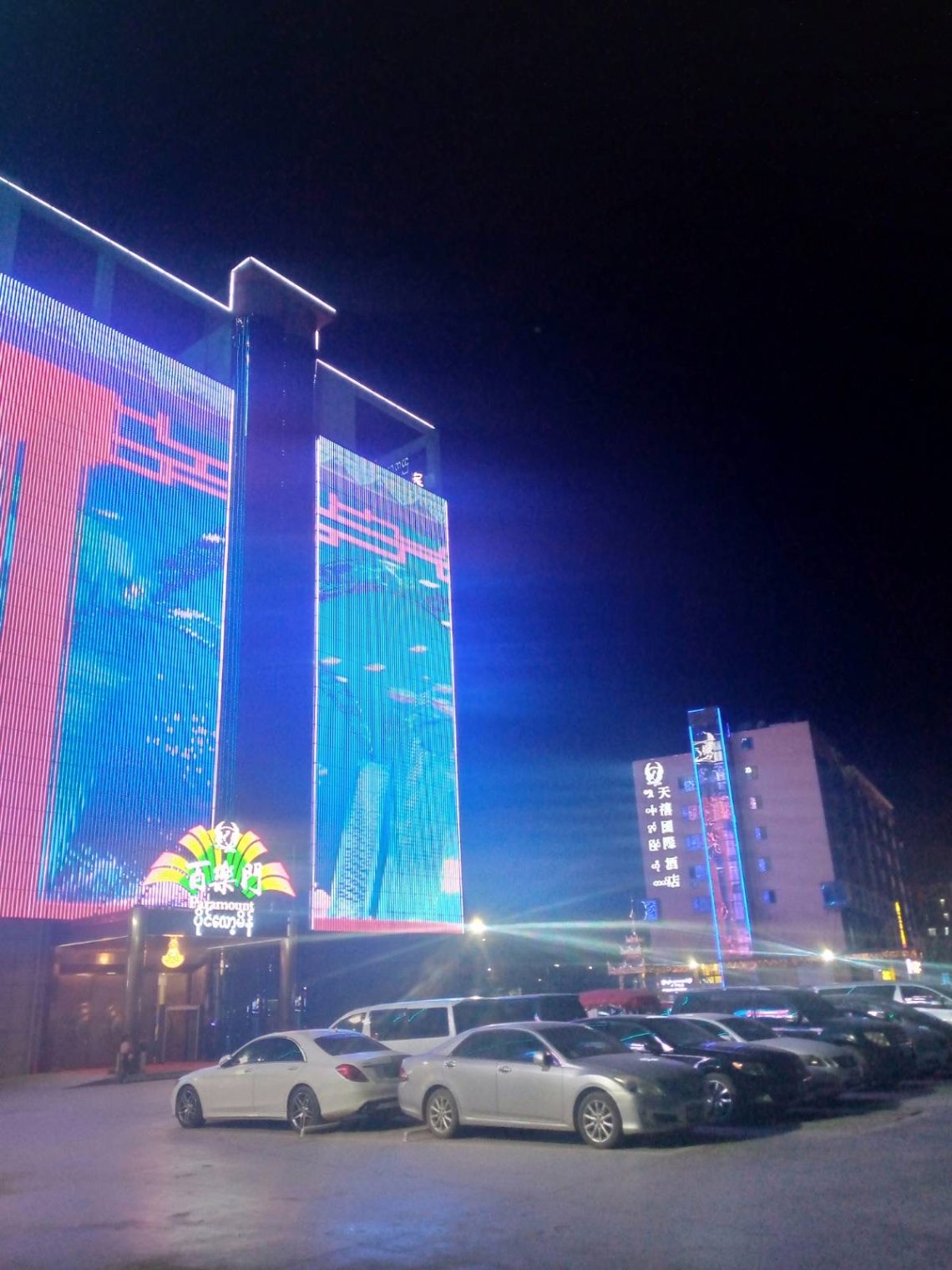
Are there any other private hospitals in Shwe Kokko besides Sitagu Hospital?
There are about seven private clinics, and they are always crowded with staff getting glucose IV infusions due to work pressure. The clinics are run by Myanmar doctors. Sitagu Hospital is run by Karen people. Mainly villagers, Myanmar military soldiers and BGF members seek treatment at Sitagu Hospital.
Shwe Kokko has four wards: 1, 2, 3 and 4. Karen people live in the village. Only Chinese, Vietnamese and Thai women are employed at Hi rooms and KTVs. There were no Myanmar women. Narcotics are easily available. Bags of K [ketamine] and WY [methamphetamine] were just put on tables. Chinese people use drugs openly.
But the BGF does not sell drugs to Myanmar workers or allow them to use them for fear that information about the drug trade will leak.
Striking government employees have worked at casinos and online scam centers in Shwe Kokko? How does BGF view them?
The BGF offers rewards for information about striking government employees and those involved in the revolution. They give a minimum of 50,000 baht for a reward. But if they arrest someone involved in the revolution, they rarely transfer him to the Myanmar military. They punish him themselves. If a Myanmar man commits an offense against a Chinese woman, they ask the Chinese employer and Yatai Co what to do.
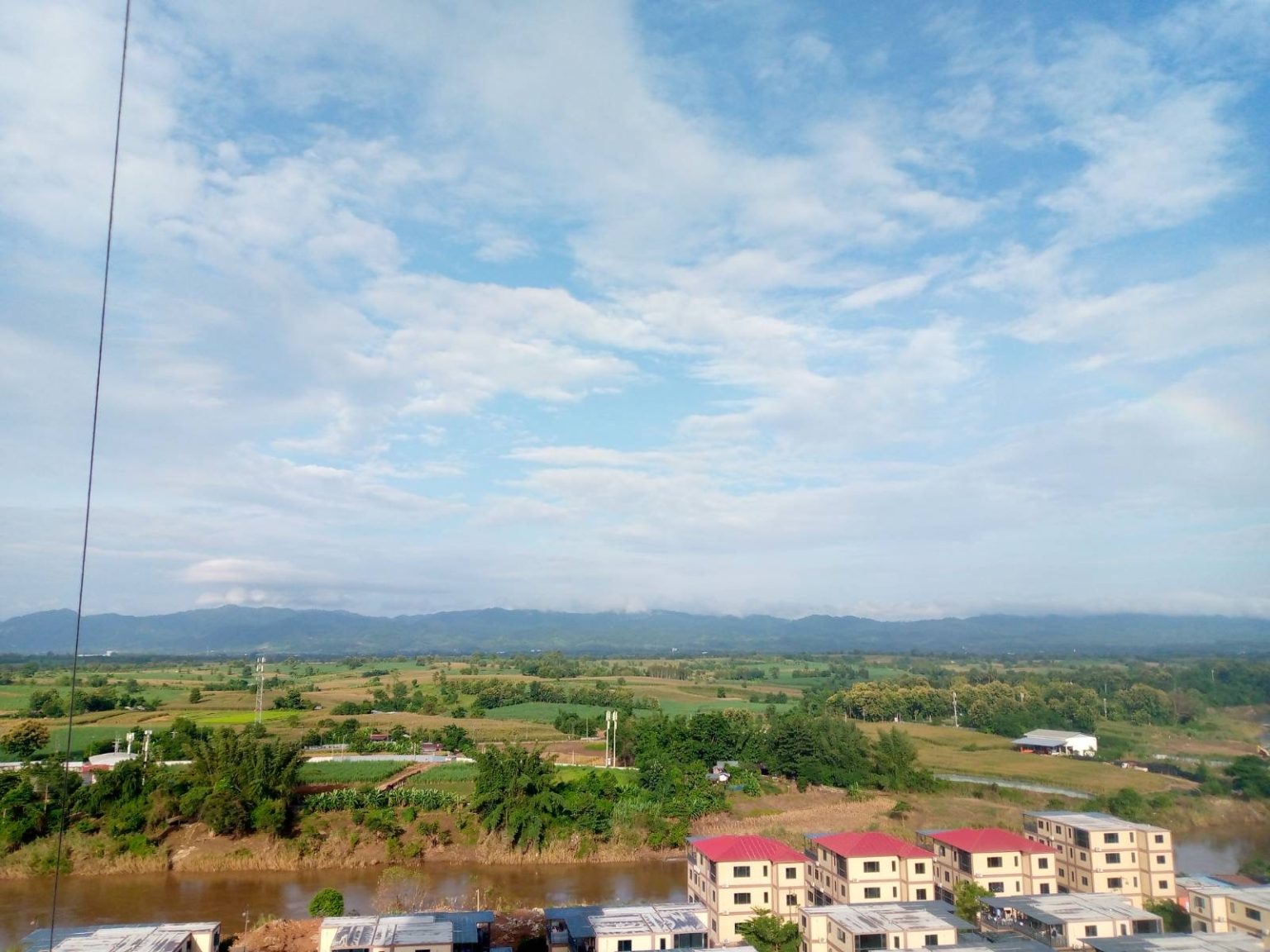
What are living conditions like for employees?
Compared with senior-level employees, lower-level employees do not face many restrictions. [At my company,] employees are given accommodations on the third floor. Eight people to one small room. It was crowded.
Security guards will ask you questions when you try to leave the compound. Employees can only use phones in their rooms. During working hours, employees can’t leave their phones in their rooms. They have to bring their phones and leave them with guards. Otherwise, they are not allowed to enter the workplace.
The boss lives on the 17th floor. He is always accompanied by two Chinese bodyguards, an Alsatian dog and four Myanmar security guards. The elevator only reaches the 16th floor, and you need a VIP card to access the 17th floor. The staircase is always locked on the 16th floor. There are always security guards there. No stranger is allowed in. Their bodyguards appear to be Chinese mercenaries. They are well-built men well-versed in martial arts and weapons. They train other security guards.
Senior officers of Yatai Co keep guns. The administration of the entire Shwe Kokko compound is run by Yatai, which also controls people entering and leaving Shwe Kokko. Traffic rules in Shwe Kokko are also enforced by personnel employed by Yatai. When there are disputes between Chinese citizens, they have to settle at Yatai Co and obey its decision. The BGF can’t interfere.
For disputes between Myanmar citizens, cases are handled by the BGF. It either imposes a fine or puts someone behind bars.
Before I arrived, an ethnic Shan man was caught allegedly donating cash to resistance groups to buy arms. I haven’t heard about him since. Some young men who had fled the junta’s prosecution under sedition law were also working in Shwe Kokko. But only a few striking government employees were working there.
Previously, they didn’t impose tight checks on employees. Then they heard that the attacks on security outposts outside Shwe Kokko in April last year were made possible by employees who leaked information. They have imposed tighter checks on people leaving and entering Shwe Kokko since then and no longer accept workers from Magwe and Sagaing.


